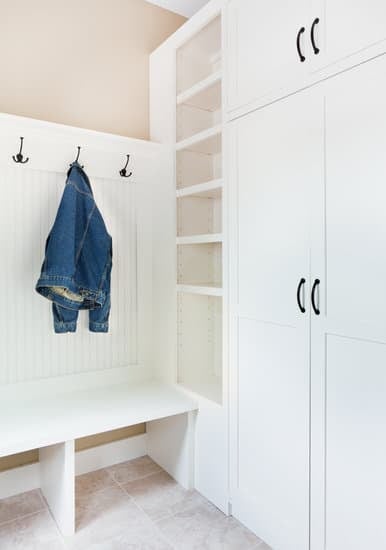Are you wondering “can you take home improvements off your federal taxes?” Understanding tax deductions for home improvements is crucial for homeowners looking to save money on their federal taxes.
Whether you’ve recently renovated your kitchen, added a new bathroom, or made energy-efficient upgrades to your home, knowing what expenses can be deducted can make a significant difference in your tax liability. In this article, we will explore the ins and outs of claiming home improvement deductions on your federal taxes, providing valuable insights and guidance to help you navigate the complexities of tax laws related to home improvements.
When it comes to tax season, homeowners may be wondering if they can take advantage of any deductions for the home improvements they’ve made throughout the year. Homeowners can potentially reduce their tax burden by claiming certain home improvement expenses as deductions on their federal taxes.
However, understanding the nuances of these deductions is essential to fully leverage potential savings and avoid any compliance issues with the IRS. In this comprehensive guide, we will delve into the eligibility criteria, qualified home improvements, documentation requirements, limitations, and even tax credits for energy-efficient upgrades.
Navigating tax deductions for home improvements requires a solid understanding of what expenses qualify and how to properly document them. From determining whether a specific upgrade qualifies for a deduction to keeping meticulous records of all relevant expenses, homeowners need to be well-informed about the intricacies of claiming these deductions.
Additionally, staying abreast of any limitations or restrictions on claiming such deductions is essential for maintaining compliance with tax laws. This article aims to provide invaluable information and tips to ensure that homeowners make informed decisions when it comes to claiming home improvement deductions on their federal taxes while emphasizing the importance of seeking professional assistance when needed.
Understanding Tax Deductions for Home Improvements
Understand how home improvements can help you when filing your federal taxes. Here’s what you need to know:
- Home improvements that can qualify for tax deductions: Certain home improvements are eligible for tax deductions, including energy-efficient upgrades and renovations that increase the value of your property. These can include adding solar panels, installing energy-efficient windows and doors, or making other environmentally friendly upgrades to your home.
- – Home repairs vs. improvements: It’s important to note the difference between repairs and improvements when it comes to tax deductions. Generally, repairs are considered maintenance and are not deductible, while improvements that add value or prolong the life of your home can be eligible for tax deductions.
- Qualifying criteria for claiming tax deductions: To be eligible for tax deductions for home improvements, homeowners must meet certain criteria. You must own the home in which the improvement is made, and it must be used as your primary residence. Additionally, the improvement must genuinely enhance the value of your property or make it more energy efficient.
Remember these key points as you consider whether certain renovations or upgrades on your home can help save you money on your federal taxes. If you want to find out if you qualify for specific deductions related to a particular type of home improvement project, always seek advice from a qualified tax professional to ensure compliance with relevant regulations and laws.
Eligibility for Tax Deductions
Criteria for Claiming Tax Deductions
In order to claim tax deductions for home improvements, homeowners must meet certain criteria. The IRS specifies that the improvements must be a “substantial benefit” to the property and increase its value. This includes additions, remodeling, and landscaping that enhance the aesthetics, functionality, or energy efficiency of the home. It is important to note that repairs and maintenance do not qualify for tax deductions.
The 2% Rule
One key eligibility requirement for claiming tax deductions on home improvements is the 2% rule. This rule states that only expenses exceeding more than 2% of your adjusted gross income (AGI) can be claimed as an itemized deduction. This means that if your AGI is $50,000, you can only deduct home improvement expenses that exceed $1,000.
Homeownership Requirements
In addition to meeting the criteria for substantial benefits from home improvements, homeowners must also meet ownership requirements to be eligible for tax deductions. The property must be considered your primary residence or a second home in which you live at least 14 days out of the year.
These eligibility criteria are essential for homeowners to consider when planning and executing home improvement projects with potential tax benefits in mind. By understanding these requirements, homeowners can ensure compliance with tax laws and maximize potential savings through their property upgrades. Additionally, consulting a tax professional can provide valuable guidance in navigating these eligibility criteria and ensuring proper documentation for claiming deductions on federal taxes.
Qualified Home Improvements
When it comes to taking home improvements off your federal taxes, it’s essential to understand which types of improvements qualify for tax deductions. Knowing what can be considered for tax deductions can help homeowners maximize their potential savings and ensure compliance with tax laws. Here’s a detailed list of qualified home improvements that can potentially be eligible for tax deductions:
- Energy-efficient upgrades such as solar panels, energy-efficient windows, doors, and HVAC systems
- Home security systems and fire alarms
- Accessibility improvements for the elderly or disabled individuals
- Roof repairs or replacements
- Bathroom and kitchen renovations that improve the overall value of the home
It’s important to note that not all home improvements automatically qualify for tax deductions. The criteria for determining whether a home improvement qualifies for tax deductions often depend on factors such as the purpose of the improvement, its impact on the home’s value, and its energy efficiency. Understanding these criteria can help homeowners make informed decisions about which projects to undertake in order to maximize their potential tax benefits.
In addition to understanding what types of home improvements can be considered for tax deductions, it’s equally important to keep proper documentation and receipts for all home improvement expenses. This documentation will serve as proof of the expenses incurred, making it easier to substantiate any claims made on federal taxes.
By maintaining organized records of all home improvement costs, homeowners can ensure that they are prepared to provide evidence in case of an audit or review by the Internal Revenue Service (IRS).
Documentation and Proof
When it comes to claiming tax deductions for home improvements, proper documentation and proof of expenses are crucial. Without the necessary paperwork, homeowners may have difficulty substantiating their claims and could face challenges if audited by the IRS. Therefore, it is essential to understand what type of documentation is required and how to maintain organized records for tax purposes.
Importance of Keeping Records
Keeping detailed records of home improvement expenses is vital for two main reasons. First, it provides evidence to support any deduction claimed on the federal tax return. This includes receipts, invoices, contracts, and any other relevant documentation that proves the cost of the improvement. Second, maintaining accurate records can help homeowners track their total investment in home improvements over time, which can be beneficial when selling the property or determining its adjusted basis for tax purposes.
Organizing Documentation
To effectively document home improvement expenses, homeowners should establish a system for organizing and storing receipts and other paperwork. This may involve creating a dedicated file or folder specifically for home improvement documentation, either in physical form or electronically. It’s also important to clearly label each document with details such as the date of the expense, description of the work performed or materials purchased, and the name of the contractor or supplier involved.
Maintaining Proof of Payment
In addition to invoices and receipts, homeowners
Limitations and Restrictions
When it comes to taking home improvements off your federal taxes, it’s essential to be aware of the limitations and restrictions that may apply. While certain home improvements can potentially qualify for tax deductions or credits, there are specific rules and regulations that homeowners need to consider.
One important limitation to keep in mind is the distinction between repairs and improvements. Generally, maintenance and repair expenses are not eligible for tax deductions, as they are considered necessary upkeep rather than enhancements to the property. On the other hand, home improvements that increase the value or efficiency of the home can qualify for tax benefits.
Another key restriction is related to the timeframe for claiming deductions. Homeowners must typically meet certain criteria regarding when the improvement was made, how long they have owned the property, and whether it is used as a primary residence. Understanding these timing requirements is crucial for determining eligibility for tax deductions.
Additionally, there may be specific limitations on the amount of expenses that can be deducted or credited for certain types of home improvements. For example, some energy-efficient upgrades may have maximum allowable credit amounts, which could impact the overall tax benefits that homeowners can claim.
Ultimately, being knowledgeable about these limitations and restrictions can help homeowners make informed decisions about their home improvement projects and understand how they can potentially benefit from federal tax incentives.
| Home Improvement Tax Deduction Limitations | Details |
|---|---|
| Repairs vs Improvements | Maintenance and repair expenses are generally not eligible for tax deductions. |
| Timing Requirements | Homeowners must meet specific criteria regarding when the improvement was made. |
| Expense Limits | Certain types of home improvements may have maximum allowable credit amounts. |
Tax Credits for Energy-Efficient Improvements
One of the most significant benefits of making home improvements is the potential to claim tax credits for energy-efficient upgrades. Unlike deductions, which reduce your taxable income, tax credits provide a dollar-for-dollar reduction in your tax liability.
This means that if you’re eligible for a tax credit of $1,000 for your energy-efficient improvements, it directly reduces the amount of taxes you owe by $1,000. With this in mind, it’s crucial to understand the specific requirements and benefits of claiming tax credits for these types of upgrades.
To qualify for tax credits for energy-efficient improvements, homeowners must ensure that the products or systems they install meet the criteria set by the IRS. Generally, these criteria include energy efficiency ratings and environmental impact assessments.
For example, installing solar panels, geothermal heat pumps, or energy-efficient windows and doors can make homeowners eligible for tax credits. It’s important to note that not all products labeled as “energy-efficient” may qualify for these credits, so it’s essential to do thorough research or consult with a tax professional.
Furthermore, claiming tax credits for energy-efficient improvements involves proper documentation and proof of purchase and installation. Homeowners need to keep receipts and records of expenditures related to these improvements in order to substantiate their claims during tax filing. It’s also recommended to familiarize oneself with any additional requirements specific to each type of improvement in order to maximize potential savings on federal taxes.
In summary, taking advantage of tax credits for energy-efficient home improvements can result in substantial savings on federal taxes while contributing to a more environmentally friendly household. However, navigating the complexities of these tax credits requires careful consideration and expert advice when necessary. For individuals planning energy-efficient upgrades in their homes, consulting a qualified tax professional can provide invaluable guidance in maximizing potential tax benefits while ensuring compliance with relevant regulations and requirements.
Consulting a Tax Professional
When it comes to navigating the complexities of claiming home improvement deductions on federal taxes, seeking the guidance of a tax professional is highly recommended. A qualified tax professional, such as a certified public accountant (CPA) or tax attorney, can provide invaluable expertise and assistance in maximizing potential tax savings while ensuring compliance with relevant tax laws and regulations.
One key benefit of consulting a tax professional is the opportunity to receive personalized advice tailored to your specific financial situation. With their knowledge and experience, a tax professional can help you understand the eligibility criteria for claiming home improvement deductions, determine which expenses qualify for tax deductions, and navigate any limitations or restrictions that may apply.
Furthermore, a tax professional can offer valuable insights into potential tax credits for energy-efficient improvements, helping you take advantage of available incentives for making environmentally friendly upgrades to your home. By staying informed about the latest tax laws and regulations, they can also provide guidance on organizing and maintaining proper documentation and receipts for home improvement expenses.
Overall, consulting a tax professional can significantly ease the process of claiming home improvement deductions on federal taxes while minimizing the risk of errors or noncompliance. Their expertise can help homeowners make informed decisions about their home improvement projects with an eye toward maximizing potential tax benefits.
| Benefit of Consulting a Tax Professional | Details |
|---|---|
| Personalized Advice | A qualified tax professional provides personalized advice tailored to your specific financial situation. |
| Knowledgeable Insights | A tax professional offers valuable insights into potential tax credits for energy-efficient improvements and helps navigate any limitations or restrictions. |
| Risk Minimization | The expertise of a tax professional minimizes the risk of errors or noncompliance in claiming home improvement deductions on federal taxes. |
Conclusion
In conclusion, understanding the tax deductions for home improvements can potentially save homeowners a significant amount of money on their federal taxes. It is important to note that not all home improvements qualify for tax deductions, so it is crucial to familiarize yourself with the eligibility criteria and qualified home improvements outlined by the IRS. Keeping thorough documentation and receipts for all home improvement expenses is also essential in order to substantiate any claims for tax deductions.
Additionally, homeowners should be aware of any limitations, restrictions, and specific regulations related to claiming tax deductions for home improvements. This includes being mindful of the difference between repairs and improvements in the context of tax deductions. Moreover, considering energy-efficient home improvements can lead to additional tax credits, providing even more incentives for making environmentally friendly upgrades.
Ultimately, seeking professional tax advice from a qualified tax professional is highly recommended when navigating the complexities of claiming home improvement deductions on federal taxes. By staying informed about potential tax savings through home improvements and ensuring compliance with tax laws, homeowners can make the most out of their investments in enhancing their properties while benefiting from potential tax benefits.
Can you take home improvements off your federal taxes? With careful consideration and adherence to IRS guidelines, it is certainly possible.
Frequently Asked Questions
Can I Deduct Home Improvements on My Tax Return?
Home improvements are generally not tax deductible, as they are considered personal expenses. However, if the improvements increase the value of your home, you may be able to add the cost to your home’s tax basis.
What Is Tax Deductible for Homeowners?
Tax-deductible expenses for homeowners often include mortgage interest, property taxes, and certain home office expenses. Additionally, points paid on a mortgage and some energy-efficient home improvements may also be eligible for a tax deduction.
Is a Home Improvement Loan Tax Deductible?
Typically, interest on a home improvement loan is not tax deductible unless the loan is secured by your home. In this case, the interest may be deductible as part of your mortgage interest deduction if it meets certain IRS requirements. Always consult with a tax professional for specific advice related to your situation.

I’m thrilled to have you here as a part of the Remodeling Top community. This is where my journey as an architect and remodeling enthusiast intersects with your passion for transforming houses into dream homes.





